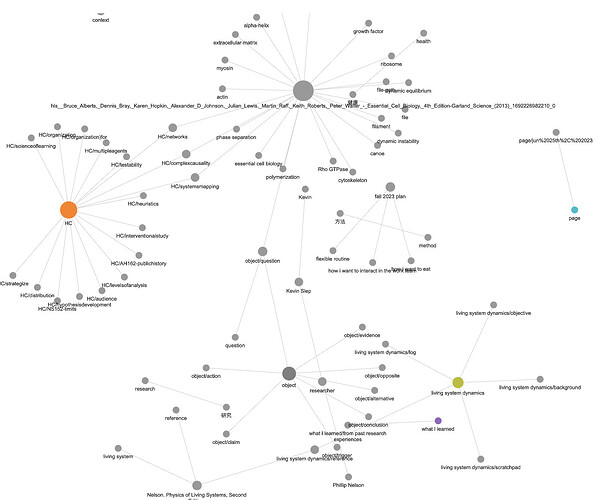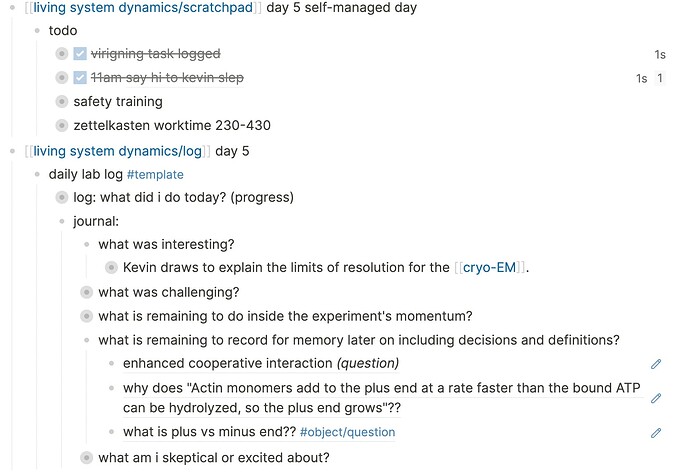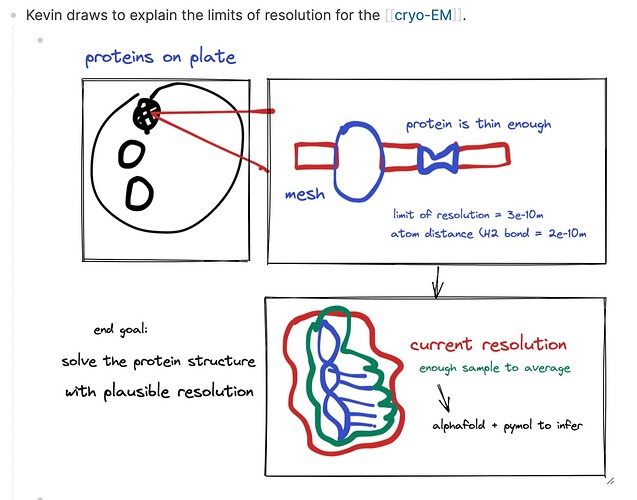Hi! I am a beginning research assistant at a cell biology lab. As my workflow, I need to write papers, remember experiment decisions, get ideas from other books and papers. Since my background is the computational but not the biological part of the research, I am also learning basics of biology from textbooks and conversations.
In my previous approach, I took lots of notes as I read or generated data or planned. But there are some problems in my workflow.
(1) when I need to use a reading, I didn’t get the most of the reading. I forget what the paper was about when I need to cite it, and what specific figure or finding was most relevant to what part of our study. I have a hard time explaining the gap between the paper and our study, in other words I didn’t fully reach the learning outcomes of the paper.
(2) when I need to write about what we did, I forget decisions I made. This resulted in constantly pivoting the question, or rewriting each section in the paper over and over again because I either had too high of a standard for the completion, or couldn’t synthesize the complex information enough to make a point.
(3) when I record simulation data and analysis, I have large codebooks, many data log files and a figma board of figures. each time I need to go over the growing body of work, the work become scattered in more places that make them harder to find.
To address these problems, I tried to first aggregate all the writing into one place (logseq). I want to make use of this tool fully to achieve my workflow for research. So far, here is what I have done:
(1) when I need to use a reading: I pull annotations into the book page, then make a paraphrased main point of a few of the quotes. I also turn the key concepts into pages through properties, but I suspect this is not the full use of properties as I want to but can’t pull up all the keywords in one list immediately.
(2) when I need to write about what we did: I keep a live draft of the paper to add to the sections each day. So far I haven’t touched any other section besides the motivation, objective and background since we are beginning this project anew.
(3) when I record data and analysis: I keep a template for lab journal to respond to each day where i refer to and annotate my files, including the data collected that day and the relevant parameters or remarks. this has been the most helpful since i didn’t use templates to organize what i need to recall and record each day before so the daily output is more stable now than before.
(4) an activity that emerged as I was using the ‘reference block’ action is that I started to accumulate questions that came up in reading or experiment that later got responded to in conversation or reading. I haven’t queried the list of questions for clearer glance yet but I think some routine around clearing the questions inbox could help with the paper drafting, since questions are obvious loopholes that show incompletion. (Unless the question is sideways branching, in which case I would like it to be stored for future reconsideration.)
I’m describing all of this as if I intentionally set up a system but in reality it was more messy and unstructured. I feel somewhat sure that my core problem in my process is forgetting decisions, which leads to passing self-set deadlines for minimal drafts. Given my priority to fix that asap, I think the most important step I want to force myself to do all the time would be to keep all my decisions and their relation to other decisions somewhere I go back to when I try to make another decision. That at the moment is the lab journal because it is the clearest and most succinct portion of my notes.
Would love to chat more about how to fully use the potential of logseq for a research workflow!
Some pictures of my workflow:
^ my graph, which is mostly two sets: (1) key vocabulary defined from a textbook (weirdly, as properties), (2) HCs, which are mental models that aid my understanding of the logic of past research, such as how to develop a hypothesis and how to decompose levels of analysis and their interaction.
^ my lab journal template, where the most helpful parts are recording my experiments that day, indexing longer notes on reading or conversation, forcing myself to summarize the action item and the challenging thing to explain, and compiling the list of questions scattered throughout the notes that day. I wish i can see the whole thing over time as mindmap.
^ using Draw to clean up the messier diagrams I jotted down in the middle of reading/chatting/doing. I haven’t used whiteboard for the research yet but probably would find it helpful for mindmapping before I write out the longer string of the background section.


